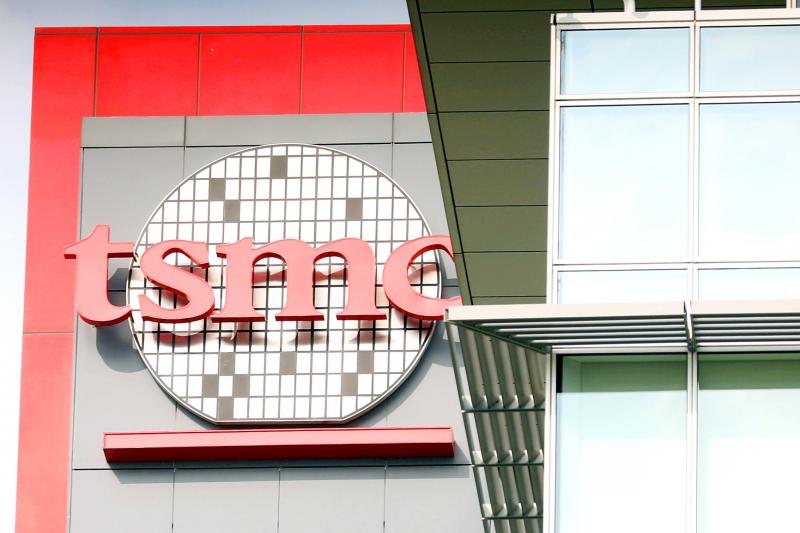Taiwan Semiconductor Manufacturing Co (TSMC, 台積電), a supplier to Apple Inc, yesterday reported a record high revenue of NT$127.59 billion (US$4.4 billion) for last month, up 3.8 percent month-on-month and 24.9 percent year-on-year.
Last month’s figure marked the second consecutive monthly record, after reaching NT$122.88 billion in August, the company said.
TSMC, the world’s largest contract chipmaker, said that while it had to halt shipments to Huawei Technologies Co (華為) due to the US’ blacklisting of the Chinese company, demand from other clients remained high.

Photo: Reuters
TSMC’s consolidated revenue was NT$356.43 billion in the third quarter, an increase of 14.71 percent from a quarter earlier, which beat its target of 9.3 percent growth.
On an annual basis, third-quarter revenue rose from NT$293 billion a year earlier and beat the average forecast of NT$337.2 billion by analysts, a Bloomberg poll showed.
The increase was driven mainly by solid demand for chips for 5G equipment, Internet of Things (IoT) and high-performance applications, as well as for 5-nanometer chips for Apple’s next generation iPhone 12, and its iPad Air and iPad Pro, the chipmaker said.
In the first three quarters, accumulated sales totaled NT$977.72 billion, up 29.9 percent from a year earlier, company data showed.
TSMC in July raised its outlook for this year, projecting that revenue would grow more than 20 percent.
Sales for the first nine months suggest that the chipmaker is on track to meet its growth forecast as the COVID-19 pandemic fueled demand for home computing equipment.
Strong demand for 5G chips is expected to boost TSMC’s sales by 8 to 10 percent in the fourth quarter, while its revenue for this year is likely to show more than 20 percent growth, said Dan Wang, a technology analyst at research firm Gavekal Dragonomics (龍洲經訊).
“Although TSMC can overcome the short-term hit of losing Huawei, it will face a bigger problem if the US government continuously limits its ability to work with Chinese companies, which make up a quarter of its clients today and will continue to keep growing,” Wang said.
Shares rose 2.26 percent yesterday to close at NT$453 in Taipei trading, after surging more than 80 percent since March, a sign that the company is bouncing back from disruptions caused by COVID-19.

NEW IDENTITY: Known for its software, India has expanded into hardware, with its semiconductor industry growing from US$38bn in 2023 to US$45bn to US$50bn India on Saturday inaugurated its first semiconductor assembly and test facility, a milestone in the government’s push to reduce dependence on foreign chipmakers and stake a claim in a sector dominated by China. Indian Prime Minister Narendra Modi opened US firm Micron Technology Inc’s semiconductor assembly, test and packaging unit in his home state of Gujarat, hailing the “dawn of a new era” for India’s technology ambitions. “When young Indians look back in the future, they will see this decade as the turning point in our tech future,” Modi told the event, which was broadcast on his YouTube channel. The plant would convert

‘SEISMIC SHIFT’: The researcher forecast there would be about 1.1 billion mobile shipments this year, down from 1.26 billion the prior year and erasing years of gains The global smartphone market is expected to contract 12.9 percent this year due to the unprecedented memorychip shortage, marking “a crisis like no other,” researcher International Data Corp (IDC) said. The new forecast, a dramatic revision down from earlier estimates, gives the latest accounting of the ongoing memory crunch that is affecting every corner of the electronics industry. The demand for advanced memory to power artificial intelligence (AI) tasks has drained global supply until well into next year and jeopardizes the business model of many smartphone makers. IDC forecast about 1.1 billion mobile shipments this year, down from 1.26 billion the prior

People stand in a Pokemon store in Tokyo on Thursday. One of the world highest-grossing franchises is celebrated its 30th anniversary yesterday.

Zimbabwe’s ban on raw lithium exports is forcing Chinese miners to rethink their strategy, speeding up plans to process the metal locally instead of shipping it to China’s vast rechargeable battery industry. The country is Africa’s largest lithium producer and has one of the world’s largest reserves, according to the US Geological Survey (USGS). Zimbabwe already banned the export of lithium ore in 2022 and last year announced it would halt exports of lithium concentrates from January next year. However, on Wednesday it imposed the ban with immediate effect, leaving unclear what the lithium mining sector would do in the